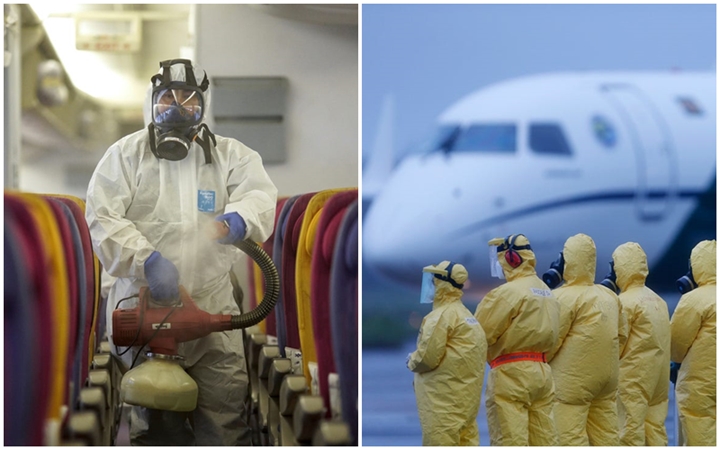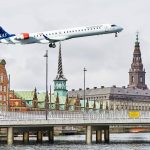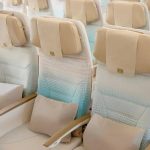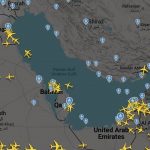To travel, or not to travel this ‘Coronavirus’ season…Indians abroad are experiencing the Hamlet’s dilemma owing to the health and life concerns over the widespread coronavirus scare. Some are cancelling their trips, while some are rescheduling their flights to India. Just like a coin with two different sides, traveling amid the coronavirus epidemic has its pros and cons. The way airlines and airports worldwide are trying not only to contain the spread of the coronavirus but also to keep it out of their borders for the safety of inbound and outbound travelers, does relieve the panic and rekindle our confidence to some extent.

Picture credit: Business Insider
Coronavirus Prevention Measures at Indian Airports
The way Kerala dealt with India’s first three positive COVID19 cases, all from the coronavirus epicenter Wuhan, prevented the virus outbreak from looming large in the state and brought them back to normal life, busts all myths and rumors about traveling to India. With 28-day strict quarantine at isolation wards of hospitals, rigid hygiene protocol, and accentuated surveillance at airports, railway stations and bus terminals, Kerala has given an exemplary model of hope and optimism to the world.
At the very onset of the Coronavirus outbreak, India restricted travel to and from China. It was followed by the ministry of health’s advisory for thorough thermal screening of inbound passengers with travel history to, from and via China. Major airports set up the 14-day quarantine facility for travelers showing any of the coronavirus symptoms on arrival in India. With timely alert and meticulous precautions, India controlled the spread of the deadly virus within its borders.
No screening of those traveling to, from and via other countries than China, until 18 Italian tourists were tested positive in Rajasthan, allowed the Coronavirus to enter India via Dubai, Italy and Iran. When the number of positive COVID19 cases rose to 29 from five, the government of India added Iran, Italy, Singapore, Thailand, Malaysia, Japan, Indonesia and Vietnam to its Coronavirus screening list at major airports, including New Delhi, Mumbai, Kolkata, Chennai, Hyderabad and Bangalore.
On March 4, the Directorate General of Civil Aviation (DGCA) issued a directive to India-bound international airlines to make their passengers self-declare their recent travel history and contact details. The same directive has been issued to the Indian airports to collect the self-declaration form from inbound passengers of those airlines upon arrival. Furthermore, the airlines operating to and from the coronavirus-hit countries have been told to disinfect the aircraft before boarding and deplaning passengers. Alongside increased vigilance at airports across India, all airlines have been mandated to provide masks, gloves and sanitizes to inflight crew and ground staff.
President Trump Says, “It’s safe to travel”
On March 4, President Donald Trump said, “It’s safe to fly in large portions of the world,” in order to mitigate the mounting dilemma – ‘to travel or not to travel’ – created by the worldwide spread of the Coronavirus. His reassuring statement, “It’s very safe to fly,” made headlines following a high-level meeting with the key executives of several airlines including American Airlines, JetBlue, United Airlines, Delta, and Alaska Airlines. The airline CEOs discussed with Trump the measures they have taken to keep the fleet disinfected and the passengers safe. Everything from aircraft cleaning procedures to travel cabin sanitation to flight attendants providing extra care to passengers on board is meant to avert COVID19. President Trump allocated $8.3 billion to tackle
Nonstop Direct Flights or Connecting Flights amid Coronavirus Scare
In current times and coming weeks of the Coronavirus epidemic, direct flights between USA and India are recommended for the shortest travel time. If itineraries for nonstop US-India flights do not suit your travel plans, you can travel on connecting flights via Doha, Dubai, Abu Dhabi, Germany, Japan, Canada, Belgium, Singapore, Sweden, and the UK; neither of these countries has reported a single case of death from the Coronavirus. 45 and 13 are the confirmed COVID19 cases found in Qatar and the UAE respectively. Canada has detected 45 positive cases so far.
Coronavirus Prevention Measures: Airlines and Airports
Though severely hit by the coronavirus impact on revenues, airlines and airports from the United States to India are making conscientious efforts to contain the spread of the virus. In compliance with the IATA guidelines for coronavirus prevention, both Indian and US airlines have stepped up the aircraft cleaning procedures and started using highly effective disinfectants to disinfect aircraft before every flight.
Delta Airlines
Delta Airlines and other US carriers are using the best of US Environmental Protection Agency-registered disinfectants for aircraft sanitation. Delta’s aircraft-cleaning team is following a 20-point checklist on cabin sanitation. Everything from seats, tray tables, seat-back entertainment screens to the areas that passengers are prone to touch on board is being sanitized with high-grade EPA-registered cleaning solutions. Extra care for disinfection of bedding, seat covers, tableware, cutlery and headphones leaves no room for coronavirus proliferation on Delta Airlines flights to Asia. All unused supplied aboard Delta flights are being discarded.
United Airlines
Having accentuated the aircraft sanitation standards, United Airlines and American Airlines are following more or less the same cabin-cleaning procedures as Delta’s. The cleaning process that United Airlines had brought to use during the Ebola epidemic in 2014 has been upgraded this time for more effectiveness and better results. Every hard surface, on both board and ground, which passengers tend to touch frequently, is cleaned and disinfected meticulously after every international trip. Any aircraft that is found to carry a coronavirus-infected traveler is barred from flying until it is disinfected through sterilization.
Singapore Airlines and Changi Airport
Like Atlanta-based Delta Air Lines, Singapore Airlines is using the ‘fogging technique’ to disinfect the aircraft between every two flights, with Calla 1452, a highly effective disinfectant that has given good results in getting the cabin rid of avian flu, SARS and H1N1 virus. 60-90 minutes of fogging is followed by another round of cleaning all over the surface of travel cabins. Unlike other carriers, Singapore Airlines has gone extra miles to contain the spread of the coronavirus before, after and during flights by providing packed towels instead of hot towels, vacuuming on-board carpets, and by not repeating the same stack of magazines every trip.
Singapore has formed a multi-agency task force to augment public hygiene standards at Changi International Airport and beyond.
Seattle-Tacoma Airport
Since the state of Washington reported its first positive case of COVID19, Seattle-Tacoma International Airport has put certain Coronavirus prevention measures in place. More than 100 hand sanitizers have been put in different parts of the airport, including security checkpoints, boarding areas, jet bridges, baggage carousels, and ground transportation areas. Airlines operating flights to and from Seattle Airport (SEA) are also providing hand sanitizers at their respective check-in counters and boarding gates. The frequency of cleaning the highly touch-prone areas, like ticketing kiosks, elevator buttons and escalator handrails, has been increased at the airport. Not only the airport but also buses and shuttles are given biohazard cleaning, multiple times a day, with hospital-grade disinfectant and wipes.
Other major US airports, including San Francisco, Washington DC, New York JFK, Atlanta Hartsfield-Jackson, Newark Liberty, Dallas/Fort Worth, Boston Logan and Chicago O’Hare have formed an anti-coronavirus task force for implementing rigid prevention measures.
US Airlines’ Change Fee Waiver for Coronavirus-hit Flights
American Airlines announced to waive change fees for rescheduling flights booked starting March 1 through March 16, 2020. Apart from giving the change fee waiver for new flights this month, American Airlines is also considering the change fee waiver for flights to Hong Kong, Soul, Beijing, and eleven Italian airports.
Delta Airlines is also waiving change fees for all international bookings, including flights to India from Atlanta and other US cities, booked starting March 1 until March 3, 2020.
The change fee is waived for rescheduling United Airlines flights to India from Chicago and other hubs. The change fee waiver is applicable to new bookings from March 3 to March 31, 2020 for rescheduling up to a year from the times tickets are issued. United Airlines is giving the change fee waiver for the previously booked flights to China, Seoul and Hong Kong.
Air Travel Tips amid Coronavirus Epidemic
Medical experts recommend travelers to strictly adhere to the health and hygiene rules during travel. You should make it a habit to wash your hands frequently, get a flu shot before or after a flight, and pack hand sanitizers, tissues, etc. You should abstain from walking barefoot through the metal detector at security checkpoints in order to avoid contracting the virus. Avoiding crowded areas of the airport is one of the air travel tips for the coronavirus prevention. You should wait or walk through the less crowded areas.






What about Air india?